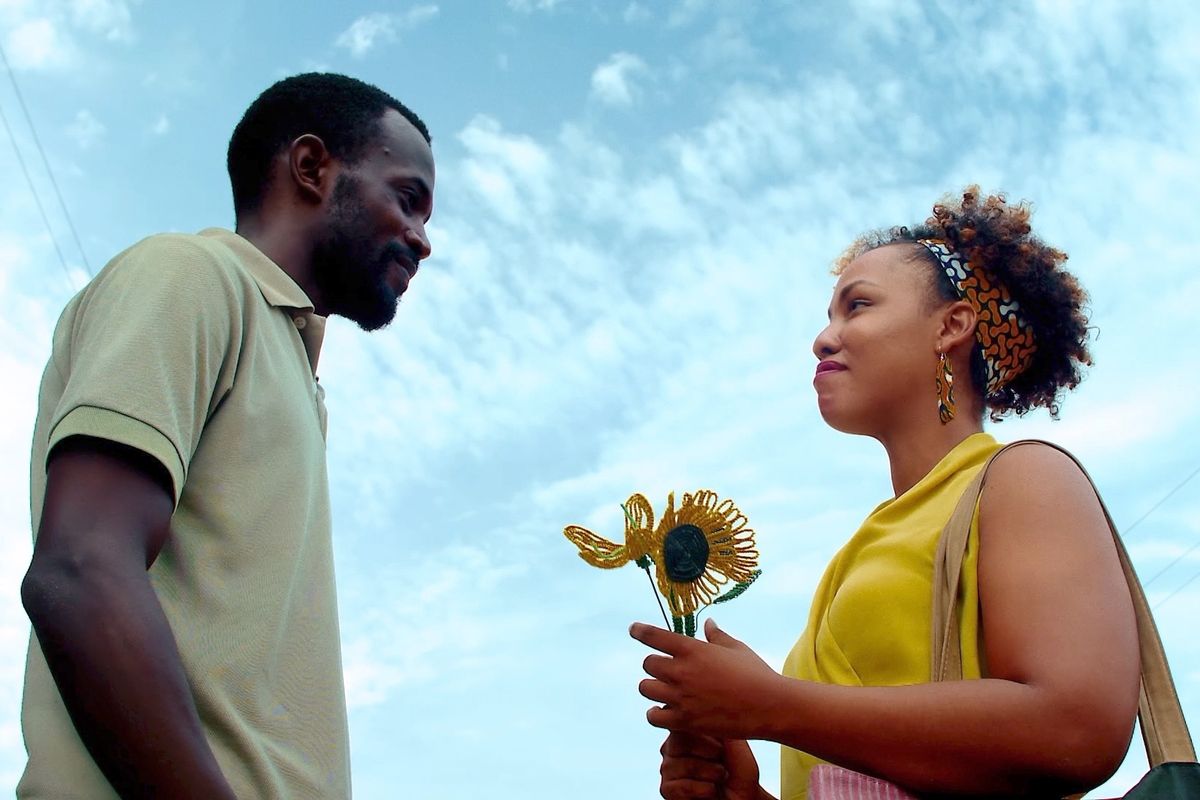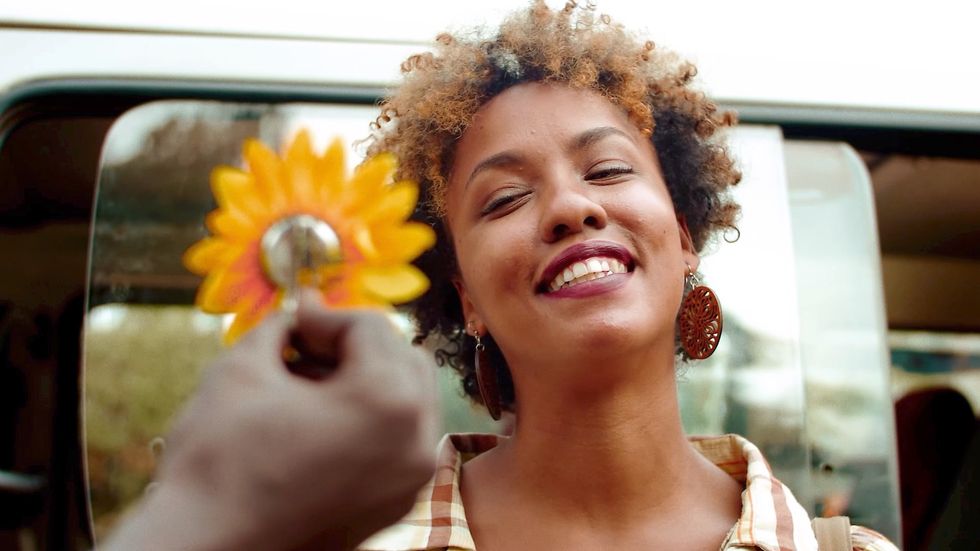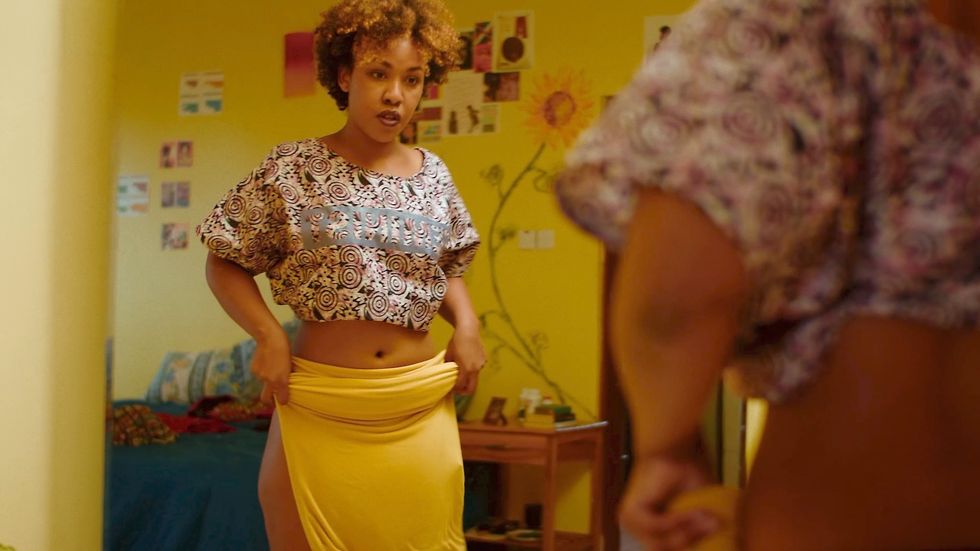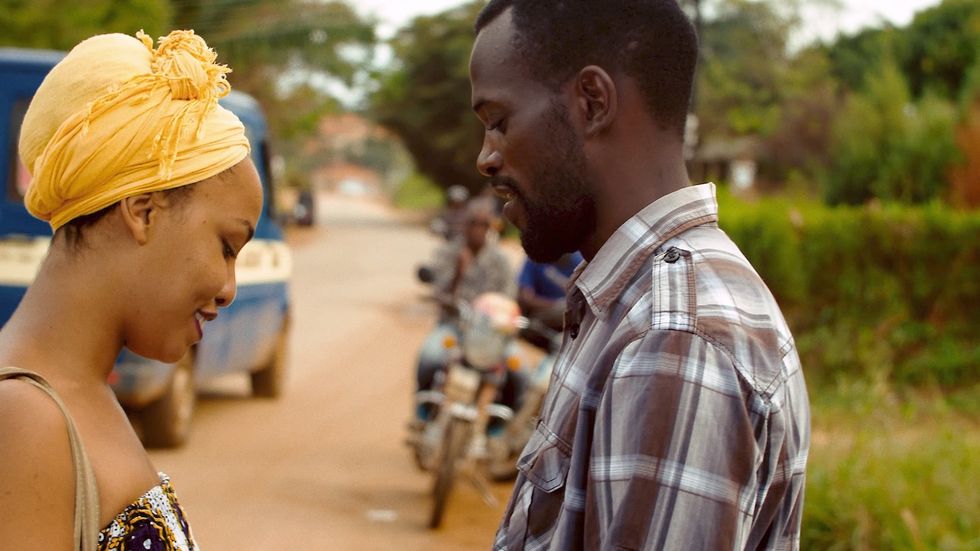'Kyenvu' Is the Short Film Challenging Uganda’s Controversial Mini-Skirt Bill
A conversation with "Kyenvu" actor and director Kemiyondo Coutinho on the importance of truthful storytelling.

In 2014, the Ugandan parliament passed the "Anti-Pornography" law where they blamed pornography for the sexual crimes committed against women and children. In one of its introductory clauses, the law prohibited women from dressing indecently‚ and thus it went on to be widely labeled by the media as the "mini-skirt bill."
The controversial legislation later emboldened men who began engaging in mob undressing and sexual harassment of women thought to be dressed in a revealing manner.
Kemiyondo Coutinho is a Ugandan-born 'artpreneur' who believes that her superpower has always been storytelling. Kyenvu, a Luganda word for yellow, marks her debut as a film director. Not only did she write, produce and direct the film, Coutinho is in front of the camera playing the lead role as well.
Kyenvu is an incredibly sufficient short film that follows a playful, authentic female character whose life is forever altered because of her choice of dress.
The film landed its first major award at the Pan African Film Festival (PAFF) in February. PAFF is an Oscar-qualifying festival, meaning that after this win Kyenvu can be submitted to the Academy for consideration.
After watching the film, we spoke with Coutinho in-depth about the importance of Kyenvu and truthful storytelling. Read our conversation below.
This interview has been edited for length and clarity.
Camille Storm for OkayAfrica: Can you tell us a little bit about the film and the inspiration behind it?
Kemiyondo Coutinho: From our synopsis, the film shows an independent young woman living through the taunts of using public transport on a daily basis. As she struggles to find her footing in a patriarchal society that entitles men to women's bodies, she finds love in a bitter sweet moment.
I wanted to see Uganda presented in its complexity. We have issues but we also have beauty. There is a lot that needs to be fixed but there is also a lot that is just perfect about Uganda. I felt that the films I had seen hyper-focused on what was wrong. This felt false to me and seemed to play right into the eye of the 'poverty porn'-obsessed West. So here was this issue I felt compelled to tell and I tasked myself to take it on alongside the multitude of layers that Uganda presents. Additionally, I wanted to refute the idea that we needed to import talent to have world class cinema and so I made the conscious choice to do the film with one-hundred percent Ugandan cast and crew.
Why was it so important for you to tell this story?
In some ways I feel like Kyenvu is telling two stories—the story in the film but also the story of the film. To address the movie within the film, we need to watch ourselves to make change. Even as a director and actor, I watch myself on the playback and make adjustments from what I am seeing. It is harder from within the scene because I am in the scene. This is like life. We are living and very rarely do we get to watch ourselves. It is important to me that people saw the role they were playing in the violence against women. That harmful sexist joke doesn't seem so funny when you realize how it contributes to the culture that perpetuates these cases. The choice not to correct your male friends when they say something out of line doesn't seem so passive anymore. It was important to tell a story that allows for the reflection of us as a society and how much we value or rather doesn't value the female body.
The creating of Kyenvu tells a story that is very important to me. Whenever I feel helpless I turn to storytelling. This has been my go to since I was 17 and could not find a one-woman play about an African woman, yes the whole continent! At 17 I learnt that I could complain—or I could do and so if I see a missing gap, I will fill it.

What was the process of making Kyenvu?
I wrote Kyenvu in 2014 when the "Anti-Pornography" had passed. I went back to Uganda in August and had to do a lot of asking around. I only knew Isaac Oboth, who is a fabulous filmmaker I respect and admire. He introduced me to everyone on that set. I simply asked for the best of everyone in the field. I wanted Kyenvu to be a professional business card for Uganda's film industry. You liked the score? Great, look no further than Andrew Ahurra. You were taken aback by the editing? Call Peter Mukiibi! Never heard sound like that? Wonderful, here is Moses Bwayo's number. I wanted the film to show off our talents.
We shot the film in three days but the post-production took long. Mainly because all the people working on it also had many other projects and took this on as a passion project. When you are not being paid for a job, it always takes the backseat to paying clients because it has to. That said, I think the time we took with it shows and I believe projects arrive at the right time. The conversation about women has taken a very prominent stand in the past few months and so Kyenvu comes at a time to further aid that conversation.
This was your first time directing a film. What was that like for you, and what challenges did you face along the way?
It gave me a lot of freedom. I knew what I knew and I leaned into that very strongly. I had no ego about what I didn't know and so it was easy to trust my crew. For instance, I think in metaphoric images; so I would communicate the particular image and what it means to the story to my DP and let him decide how he wanted to interpret that. Even if I wanted to, I could not tell him what to physically do with his camera to achieve what I wanted, so I had no choice but to trust him. I saw that this actually gave the crew a lot of freedom to flex their own skills—so I promised myself to carry this forward. I also did not have the pressure of a previous film, good or bad. If I failed, I could rely on the "it was my first film" line that has now been stripped off me. Due to my years of acting it also allowed me to talk to the actors in "actor talk" versus "director talk"—which I found helpful. The actors saw me as one of them and not as the person telling them what to do. Artists come to work to create not to fulfill instructions. In some ways my lack of experience allowed for that experience.
I faced the obvious challenge of imposter syndrome. I did have a moment I have spoken about on set. One of the crew members would always talk to Bwayo (head of the sound department) whenever he was discussing something. He would ignore me, the director, who hired him and seek Bwayo's approval. It was a real slap [in the face] that as a woman, even when the hierarchy is tipped in your favor, you are still "just a woman" in some people's eyes. The other challenge is this film journey is still going on—applying to festivals, learning about festivals and the politics and game of that is all new to me. No one tells you about that part. I thought after I made the movie I would be done, but the phase I am in now has proven to be the most taxing of the entire experience. I don't have a "star-studded" cast. I am not a household name. So, you must work even harder to make sure your film gets the publicity it deserves. Luckily I am an African woman—I have a lifetime worth of experience in working harder than the rest.

Kyenvu won the 'Best Narrative Short Film' at the PAFF Awards in February. How does it feel to be able to qualify for Oscar film submission?
It is like trying a key in many doors and it finally opens and you are so happy. Then on the other side of the door is another huge key whose huge door awaits. I got a gift that came with another gift. It is scary to even let your mind think about the "what if" because you get so excited about the possibility. But you must! That is the crazy thing about this artist life. Normal people protect themselves from hurt but as artists we constantly open our heart to the world and say "I am here! I want this! Please don't hurt me." Don't worry—I make up for this openness in my dating life.
I decided to make the decision that I will do everything in my power to get this film seen by the Academy. I don't have a publicist, I don't have all the other things that everyone had told I would need to get the Academy's attention, but what I do have is a story. I must do my part for that story. I did not have any of the things I would need to make a film and somehow a film was made. If I did it then why not continue ignoring the "must haves" and going for what I want.
What's the range of reactions you've received about the film so far?
It is interesting because different audiences tend to gravitate towards either the comedy—yes, it is comedic in parts—or tragedy. Ugandans really gravitated towards the comedy because it's very cultural and that taxi scene is very relatable if you have ever used public transport in most African countries. The American audience gravitated towards the love story within the film, which is actually very interesting to me. Our romance back home is different—it does not look like the movies in America and to see an appreciation of that was more touching for me than expected.
In the final scene, the character's remark, "and say that my life was changed because of a wardrobe choice," has sparked a variety of responses. Some people felt that I was advocating that what happened to her was because of what she wore. Others shared with me their own experiences and how they related to the character in the final scene. Neither is wrong. I don't write perfect characters, I write real people. Real people don't always think or say the right things. I have been in a situation and immediately blamed myself. The character is not an activist or a lecturer—she is a human being in that story with complex human reactions. To ignore my gut response and present what I wish I said is false. If you think she is wrong for that conclusion, figure out why she thinks that and do something within your circles so that no woman ever blames herself for any violent act against her.

What's the main message you would like viewers to take away from the film?
I have always created art because I want to reflect society back at itself. I don't set out to have a goal for a viewer to get something. That may seem unorthodox, but it is always how I have created and found it to be the most truthful version of art I can bring. For instance, I was inspired and compelled to tell this story because of sexual harassment and violence against women; had I decided I want audiences to know that this is wrong and they must change this, rather than my writing hyper-focus on it. In Kyenvu, you see issues of identity, class, love and colorism sprinkled in the film. When you simply reflect what you are seeing in your world, you reflect it all. If you are a Ugandan or not, this is your story. If you are a woman or not, this is your story. What you do with the image facing up at you is completely and totally up to you. My hope is that the film made you uncomfortable with what you saw and that you do something to change that image. The solution you come up with is more powerful than the one I spoon-feed you.
That said, I can control what I do with the film which is why I am partnering with several Women NGO's and organizations to screen the film in Uganda every month which will be followed by panels. All I ever want is a conversation. Some panel topics will include shifting the focus from victim to perpetrator, rape sensitivity in police stations, what it means to be an ally, the dangers of laws that shift blame on women, the importance of women behind the camera and the safety of women in Uganda.
Are you working on any interesting projects at the moment?
Around the same time I started filming Kyenvu I started a music platform called A Ka Dope. I started it to give a platform to fresh voices on the scene. While Uganda is rich in musical talent, our platforms were not reflecting the variety and diversity of that talent. A Ka Dope was born out of the need to give less conventional, but thoroughly talented, artists in Uganda a space and a platform to be able to showcase themselves. It is still running and despite my distance from it I remain very involved with it.
I start shooting my next short film Green this month which surrounds a green card marriage and explores the agents and buyers of the American Dream.
What advice would you offer women interested in filmmaking?
The same advice Ava Duvernay gave that day I saw the South African film Ayanda at an ARRAY event—if you want to make films, then make them. She put down the mic after that. That was the end of her statement. No ifs or maybe or buts or even ands. Just make it.
But because I am not Ava and quite mouthy, I will add that society has already trained you to be a filmmaker. As women, we are constantly put under pressure and we thrive under it. We constantly have people hanging a clock in our face and telling us our time is running out—sounds like my producer. We have always been given the bare minimum and been told to make the most out of it—looks just like my film budgets. We have the ability, should we want to, to create a whole new human being—what is a film to us? That is nothing. If you have walked through this life as a woman you have what it takes to be a filmmaker. By no means am I advocating for the experiences [to be] above [another's], but what I am saying is if you have gone through that you have no right to be afraid to make a film that is in your heart.
Make it. Do it. You already know how.

